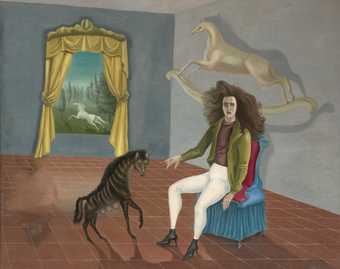Eyal Ofer Galleries
24 February 2022 – 29 August 2022

Leonora Carrington Self-portrait c.1937–38. The Metropolitan Museum of Art, New York, The Pierre and Maria-Gaetana Matisse Collection, 2002 © 2021 Estate of Leonora Carrington / Artists Rights Society (ARS), New York. Image © Metropolitan Museum of Art.
Surrealism was always international. This ground-breaking exhibition opening at Tate Modern this week reveals the broad scope of this radical movement, moving beyond the confines of a single time or place. Based on extensive research undertaken by Tate and The Metropolitan Museum of Art in New York, it spans 60 years and 50 countries to show how Surrealism inspired and united artists around the globe, from centres as diverse as Buenos Aires, Cairo, Lisbon, Mexico City, Prague, Seoul and Tokyo. Expanding our understanding of Surrealism as never before, Tate Modern shows how this dynamic movement took root in many places at different times, offering artists the freedom to challenge authority and imagine a new world.
A revolutionary idea sparked in Paris around 1924, Surrealism prioritised the unconscious and dreams over the familiar and everyday. While it has often generated poetic and even humorous works – from Salvador Dalí’s Lobster Telephone to René Magritte’s train rushing from a fireplace – it has also been used by artists around the world as a serious weapon in the struggle for political, social, and personal freedom. Featuring over 150 works ranging from painting and photography to sculpture and film, many of which have never been shown in the UK, this exhibition explores the collective interests shared by artists across regions to highlight their interrelated networks. It also considers the conditions under which they worked and how this in turn impacted Surrealism, including the pursuit of independence from colonialism and displacement caused by international conflict. Among the rarely seen works are photographs by Cecilia Porras and Enrique Grau, which defied the conservative social conventions of 1950s Colombia, as well as paintings by exiled Spanish artist Eugenio Granell, whose radical political commitments made him a target for censorship and persecution.
Familiar Surrealist themes such as the exploration of the uncanny and unconscious desires are repositioned from a fresh perspective. Visitors can see iconic paintings such as Max Ernst’s Two Children are Threatened by a Nightingale 1924 alongside lesser known but significant works including Antonio Berni’s Landru in the Hotel, Paris 1932, which appeared in the artist’s first exhibition of Surrealist works in Argentina, and Toshiko Okanoue’s Yobi-goe (The Call) 1954, addressing the daily experience of post-war Japan. Photographs by Hans Bellmer focusing on the female body are contrasted with Ithell Colquhoun’s Scylla 1938 – a double image exploring female desire – and works by both French Surrealist Claude Cahun and Sri-Lankan-based artist Lionel Wendt, whose radical photographs present queer desire outside of a Western context.
The exhibition also considers locations around the world where artists have converged and exchanged ideas of Surrealism. From Paris at the Bureau of Surrealist Research; to Cairo, with the Art et Liberté group; across the Caribbean, where the movement was initiated by writers; in Mexico City, where it was shaped by the creative bonds of women artists; and Chicago, where Surrealism was used as a tool for radical politics. Special loans including the photographs of Limb Eung-Sik and Jung Haechang from Korea and a film by Len Lye from New Zealand, will offer further insight into the adaption of Surrealism across the globe. For the first time in the UK, Ted Joans’ incredible 36-foot drawing, Long Distance 1976-2005 is displayed, featuring 132 contributors from around the world. Accompanying Joans on his travels, this cadavre exquis (exquisite corpse) drawing took nearly 30 years to complete and united artists located as far apart as Lagos and Toronto.
Surrealism Beyond Borders is organised by Tate Modern and The Metropolitan Museum of Art, New York. It is co-curated by Matthew Gale, Senior Curator at Large at Tate Modern, and Stephanie D’Alessandro, Leonard A. Lauder Curator of Modern Art and Senior Research Coordinator in Modern and Contemporary Art at The Met; with assistance at Tate Modern from Carine Harmand, Assistant Curator, International Art; and at The Met from Lauren Rosati, Assistant Curator, Leonard A. Lauder Research Center for Modern Art, and Sean O’Hanlan, Research Associate in Department of Modern and Contemporary Art.
Images
Salvador Dalí Lobster Telephone 1938 Tate Purchased 1981 © Salvador Dali, Gala-Salvador Dali Foundation/DACS, London 2022
René Magritte Time Transfixed 1938. The Art Institute of Chicago, Joseph Winterbotham Collection, 1970.426 © ADAGP, Paris and DACS, London 2022

Max Ernst Two Children Are Threatened by a Nightingale 1924. The Museum of Modern Art, New York, Purchase (256.1937) © 2022 Artists Rights Society (ARS), New York / ADAGP, Paris

